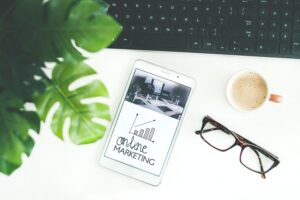Just because you use a personal Facebook account doesn’t necessarily mean that you can successfully use the same platform for business purposes. When used correctly, Facebook marketing can be extremely lucrative for just about any business. Greg Gillman is here to help you do just that with this complete Facebook guide for marketers.
What You Need to Know About Facebook
The odds are that you already know the basics of the Facebook app, but we are here to tell you the basics of Facebook marketing that you need to take advantage of this platform fully:
- Facebook has a total of 2.85 billion monthly active users
- More than 3.3 billion people use Facebook’s network of platforms, including Instagram, WhatsApp, and Facebook Messenger, every month
- 73% of US users visit the platform every day
- 98% of Facebook users access the platform on a mobile device
- 69% of Americans use Facebook
- 93% of businesses are active on Facebook
- Facebook ads provide the highest return on investment out of all paid advertising channels
- Facebook ads are economical, with an average cost-per-click of $0.55 for video ads
- In 2018, 78% of US consumers made purchases based on Facebook discoveries
- Facebook advertising generated $9.82 per user on average in Q4 of 2020
7 Different Ways to Market on Facebook
Facebook is a diverse platform with many different ways to advertise. Here are some of our favorite ways to market on Facebook:
1. Facebook Business Profile
The most fundamental way that you can market on Facebook is to create a Facebook Business profile. These are totally free types of Facebook pages. Your Facebook Business page will allow you to build brand awareness and establish your brand identity. You can include relevant information about your brand, post brand content, communicate with followers, and more.
2. Facebook Contests
Facebook is a great platform for hosting contests. This is a great way to build your Facebook profile without actually paying for traditional advertising. Instead, your followers do all the promoting for you by sharing the post and tagging friends. The return on investment for giving away a product or service will be well worth it.
3. Paid Facebook Advertisements
This is what people usually think of when they think of Facebook marketing. This involves paying for specific advertising content to appear in a variety of different formats throughout the platform. You can set campaign budgets and objectives for the best possible results. You can also set targeting mechanisms to reach the right people.
4. Facebook Promoted Posts
Similar to paid Facebook Ads, Facebook Promoted Posts allow you to pay a flat rate to reach a certain number of users with existing content. Often, regular posts can get drowned out by posts from friends, other businesses, news pages, etc. Promoting your posts essentially puts your content at the top of the feed to ensure that people actually see it.
5. Facebook Groups
Facebook Groups allow you to establish a virtual community for your business or industry. Creating a Facebook group gives you power and authority while providing members with “exclusive” access. If you don’t want to create your own group, there are thousands of already established groups that you can use to promote your business or learn more about your industry. Posts from Facebook Groups show up in a users’ news feed and Facebook Stories just like other posts.
6. Facebook Events
Facebook Events allows you to host events and invite people to attend. This is a great way to spread the word about upcoming concerts, speakers, parties, etc. People can ask questions or post discussions on the event page to get more information or even provide feedback after the fact. It’s also a great way to get an idea about event turnout based on RSVPs.
7. Facebook Live
Facebook Live allows you to stream live videos to your followers. Live videos are much more informal and authentic than other types of videos since you’re doing it on the spot without scripts or fancy editing.
As a result, live videos get higher engagement rates. You can “go live” to host a question and answer session, go behind the scenes of your business operations, or even host a virtual event.
How to Effectively Target Audiences on Facebook
One of the biggest advantages of marketing on Facebook relates to its targeting capabilities. Facebook gathers tons of data about its users that you can then tap into to reach your ideal group. Facebook targeting mechanisms range from basic to extremely detailed, so let’s explore some of the different ways that you can target the right people on this platform:
- Basic demographic information like age and gender
- Geographic location and languages
- Education level, the field of study, schools attended, years in school
- Work history, including employers, job title, and industries
- Home type, homeownership status, and household composition
- Life events like a new job, new relationship, newly engaged, newly married, recently moved, etc.
- Political affiliations and whether they’re like to engage in politics
- Ethnic affinity including African American, Asian American, and Hispanic
- Generation including Baby Boomers, Generation X, and Millennials
- Parental status with more detailed information regarding the age of children
- Interests including business and industry, entertainment, family and relationships, fitness and wellness, food and drink, hobbies and activities, shopping and fashion, sports and outdoors, and technology.
- Behaviors based on past actions taken on the platform or on other connected platforms
- Connections based on what type of connection they have to your page, app, or event
- Remarketing to reach back out to people who have previously interacted with your business
Clearly, there’s a lot to digest here. It’s almost too much. However, you definitely don’t have to incorporate each and every targeting mechanism for an advertisement to be effective. Instead, focus on your customer persona and select the characteristics that are most important for your business. Some characteristics will be more important than others, depending on your business and industry.
At the end of the day, you have the power and the ability to reach the right people through Facebook advertising targeting mechanisms.
Facebook Marketing Best Practices
It’s time to bring that all together with some Facebook marketing best practices so that you can get the best possible results on this valuable platform:
- Include a strong call to action that describes what the viewer should do after viewing the ad
- Prioritize video advertisements as those tend to have higher engagement rates with lower costs
- Establish a posting schedule to ensure that you’re posting the right content at the right times
- Use things like hashtags and emojis to embellish your content and make it more searchable
- Always provide value with your posts to promote higher engagement rates
- Keep posts short, sweet, and to the point to blend in with the overall nature of the platform
- Partner with social media icons to establish a reputable and trusted brand image
Final Thoughts on Facebook Marketing
And there you have it — the complete guide to advertising on Facebook. Feel free to reach out to Greg Gillman if you have any additional questions about how you can use the largest social media platform in the world to grow your brand and achieve your business goals.
Sources:
5 Reasons Why You Should Still Be Advertising on Facebook | Entrepreneur
Facebook MAU Worldwide 2020 | Statista
25 Quick Tips for Marketing Your Business on Facebook | Forbes


